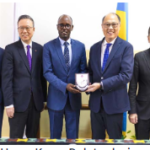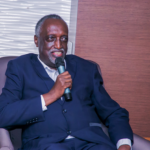In 2021, massive celebrations swept over Zambia when Hakainde Hichilema and the United Party for National Development (UPND) emerged victorious in the national elections.
The Patriotic Front, Zambia’s ruling party at the time, was widely accused of being authoritarian. Hichilema’s UPND, on the other hand, had advocated for democracy for many years as an opposition party in Zambia. Now that it was at the helm, Zambians were finally going to enjoy democracy after years of dictatorship under Edgar Lungu’s Patriotic Front.
Or so people thought. In the two years that the UPND has been in power, a lot has happened that points to the stark reality that UPND is not the harbinger of democracy that the people of Zambia envisaged.
Opposition leaders have been arrested, Voice of America reported on 2 November 2022, demonstrations were prevented, according to a Deutsche Welle report on 11 January 2023, and a cleric was summoned by the police, allegedly for criticising the government, Human Rights Watch reported on 8 April 2024.
This begs the question: Are human rights respected in Zambia under this new government? And, perhaps more importantly, what does the general human rights situation in Zambia mean for academic freedom?
Human rights in Zambia under UPND
Several human rights groups, including Human Rights Watch, have blown the whistle on the treatment of critics by Hichilema’s government.
“The conviction and sentencing of a leading opposition member to 18 months in prison with hard labour will have a broad chilling effect on the right to freedom of expression in Zambia,” Human Rights Watch wrote on its website on 23 May 2024 after the sentencing of Raphael Nakacinda, a top opposition politician.
Nakacinda was convicted under a law that criminalised defamation of the president. It has since been repealed. Before the law was annulled, it was used to arrest at least 12 of Hichilema’s critics, some several times, Voice of America reported on 26 December 2022. But, even with that law gone, concern has been raised about how the government allegedly uses another law, the Cybersecurity and Cybercrimes Act, to silence, according to Human Rights Watch.
Legislation is not the only mechanism through which the government has been accused of silencing dissent. Even without using any legal provisions, the government seems very capable of sending a chill down the spine of a critic. A cleric who spoke about deteriorating living standards was summoned by the police in 2023, allegedly for being critical of the government, according to Human Rights Watch.
More and more, it is becoming clear that enjoying human rights in Zambia is limited. This is confirmed by Freedom House’s latest report on Zambia which notes that 2023 was characterised by arbitrary arrests of opposition members, disruption of opposition party gatherings, and harassment of journalists.
What about academic freedom?
In the 2005 APEID, UNESCO Bangkok Occasional Paper Series Paper No 5 titled, ‘Academic freedom in countries of Asia’, author Charas Suwanwela, professor emeritus at the College of Public Health at the Chulalongkorn University in Bangkok, noted that academic freedom is “certainly part of the human rights situation in the country, which depends on the type of government”.
He argued that academic freedom should not be viewed in isolation but ought to be analysed using a framework that considers its interconnectedness with what is going on in the rest of the country. He would be shocked to find academic freedom respected in a country that is generally authoritarian and vice versa.
Viewed through Suwanwela’s analytical lens, academic freedom in Zambia is likely limited because other civil liberties are limited. There is only one major problem with this line of thought, especially when looking at Zambia. In as much as many opposition figures and other critics of the government have been targeted, there have been no reports that the government has also targeted academics. As a matter of fact, the Freedom House report on Zambia states that the government “generally does not restrict academic freedom”.
Does this mean there is actually academic freedom in Zambia? That, contrary to Suwanwela’s claims, academic freedom can be respected in a country where other civil liberties are disregarded? Does this mean that, in Zambia, the university, which is the main arena where academic freedom is practised, is being treated as an island of freedom?
Are Zambian universities islands of freedom?
Theoretically speaking, the whole concept of academic freedom means that universities, in as far as liberties are concerned, should be treated with special care. Universities have a special mission, that of knowledge production, and ought to be protected from any hindrance that can prevent them from fulfilling this mission.
Such hindrances include censorship and violation of liberties that are essential for free thought and the free flow of ideas. As such, in theory, universities are supposed to be islands of freedom where liberties should be respected, even in countries where liberties are not fully guaranteed elsewhere.
In the case of Zambia, the government seems, at face value, to be treating the university as an island of freedom. Even though opposition critics of the government have been targeted, no reports have been made regarding the targeting of lecturers and violation of academic freedom. In reality, however, when a government goes after all its other critics except academics, it instils a culture of fear in all its critics, including the academics.
Put somewhat differently, the mere act of going after its critics off campus intimidates the government’s critics on campus. Furthermore, academic freedom and freedom of expression, which is one of the human rights under attack in Zambia, are so connected that it is difficult to imagine that one can exist without the other.
Is academic freedom possible without freedom of expression?
Without freedom of expression, perhaps one could enjoy some elements of academic freedom, such as the right to access information, but they will certainly not enjoy academic freedom in its fullness. That’s because freedom of expression is a critical element of academic freedom, which, simply defined, is the freedom to seek and impart knowledge in an academic set-up.
It is rather difficult to impart knowledge without the freedom to fully express yourself. As such, it can successfully be argued that limited freedom of expression in Zambia automatically limits academic freedom, mainly through self-censorship.
In a country where politicians are convicted for criticising the president and clerics are summoned by the police, allegedly for talking about economic hardships from the pulpit, many academics will certainly choose their words carefully when teaching or writing about the government.
Prospects for academic freedom
Despite facing regular criticism from the opposition party, which is simply playing its role of trying to hold the ruling party to account, UPND seems to still enjoy a lot of support from regular citizens. Academics do not seem especially critical of the government. It is quite possible that what seems like treatment of the university as an island of freedom today is simply because it does not criticise government, yet.
If it so happens, however, that academics become very critical of the establishment, the government will most likely respond with the same heavy-handedness it has used to silence opposition figures and other critics. What will stop a government that allegedly targeted a cleric in a country where religious figures are very important members of society from going after academics?









